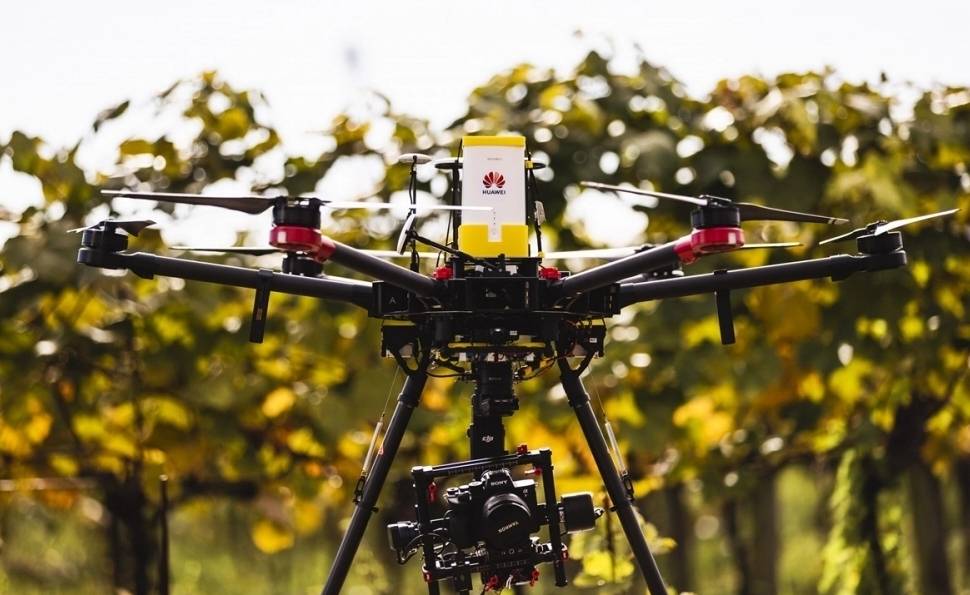
Eco-friendly technologies from Huawei to smart agriculture applications
Austrian Ministry of Finance Telecommunications, Postal Services and Mining General Manager Andreas Reichhardt:- “Huawei and Dronetech’s project for the use of unmanned aerial vehicles in agriculture is a first in Austria. We aim to ensure efficient harvesting processes and increase product quality”.
As in many other sectors, Huawei continues to work with its business partners to provide efficiency-oriented solutions in the field of agriculture.
One of the most up-to-date projects in the field of agriculture was introduced at the “5G Smart Agriculture Tour” event organized by Huawei in Austria. In smart agriculture projects supported by 5G technology, Huawei, collaborating with the unmanned aerial vehicle service provider Dronetech, introduced a project that will prevent more than necessary spraying in agricultural areas.
Unmanned aerial vehicles, which will provide instant data with the 5G-based visual transmission technology developed by Huawei, will observe the agricultural areas and provide the necessary data for spraying only in the needed areas and in the required amounts. Aircraft, which will scan large areas, will be able to transmit large amounts of data to be obtained from here, in real time. In this way, agricultural areas that need to be intervened or examined will be accessed quickly and the development of the products will be followed in real time.
In the project where 5G, artificial intelligence and internet of things technologies were used together, Huawei Turkey R&D Center played an important role in the project with the artificial intelligence data interpretation software it developed.
At the meetings and panels hosted by Huawei within the scope of the event, the benefits of technology for the sustainable agriculture sector and the development of the food safety ecosystem with less pesticides were also discussed.
Artificial intelligence-focused solutions are at the forefront
The cooperation of the two companies has reached the second phase, called “Digital Sky” within the framework of the project. In this context, Huawei will also offer cloud computing services along with 5G technologies, which will form the basis of real-time artificial intelligence analysis. In the same process, drones equipped with high-resolution cameras and sensors will conduct research activities across farmland to acquire images and data to be processed with artificial intelligence, providing findings that will help create a more sustainable, healthy agricultural ecosystem.
Through the analyzes to be carried out within the scope of the project, precise measurements of the use of water, chemicals and pesticides can be made, helping farmers detect harmful factors such as small insects, monitor crop status and predict the development process of harvests.
In the second phase of the project, it also plans to develop a common economic approach to drone services. Stakeholders, including farmers, municipalities, companies and individuals working in this field, will be able to benefit from unmanned aerial vehicles and artificial intelligence solutions for different applications such as inspection of solar panels, traffic management and wear detection of power lines.
“It is extremely important in terms of efficient use of resources”
Andreas Reichhardt, General Manager of Telecommunication, Postal Services and Mining at the Austrian Ministry of Finance, stated that Huawei and Dronetech’s project for the use of unmanned aerial vehicles in agriculture is a first for Austria and said, “Here, we want to analyze the development of products with real-time image diagnostics. “While doing all this, we aim to increase the efficiency of the harvesting processes and increase the product quality. While doing all these, we also want to take advantage of the opportunities of the digital transformation age. For this, we needed an optimal infrastructure offered by 5G technology.” used the phrases.
Erich Manzer, Vice President of Huawei Austria, said: “5G was developed for three main application areas: high bandwidth, low latency and being able to connect millions of devices. Integrating unmanned aerial vehicles with 5G technology is extremely important for efficient use of resources.” said.
According to the information given, Huawei continues its efforts to ensure that 5G technologies can be used in the most efficient way in different sectors in Turkey. Huawei Turkey R&D Center, which has signed many projects for this purpose, includes 5G, artificial intelligence, cloud technologies and Huawei Mobile Services (HMS). Playing an active role in this project with its artificial intelligence and data interpretation software, Huawei Turkey R&D Center continues to contribute to 5G and artificial intelligence technology on a global scale.
The biggest difficulty in using 5G supported unmanned aerial vehicles in the agricultural sector is shown as network coverage areas. Today, 5G networks are mostly designed for end users located at ground level or indoors. The development process for high-quality coverage areas for drones that routinely fly 50 meters above the ground is expected to continue in the coming period.

